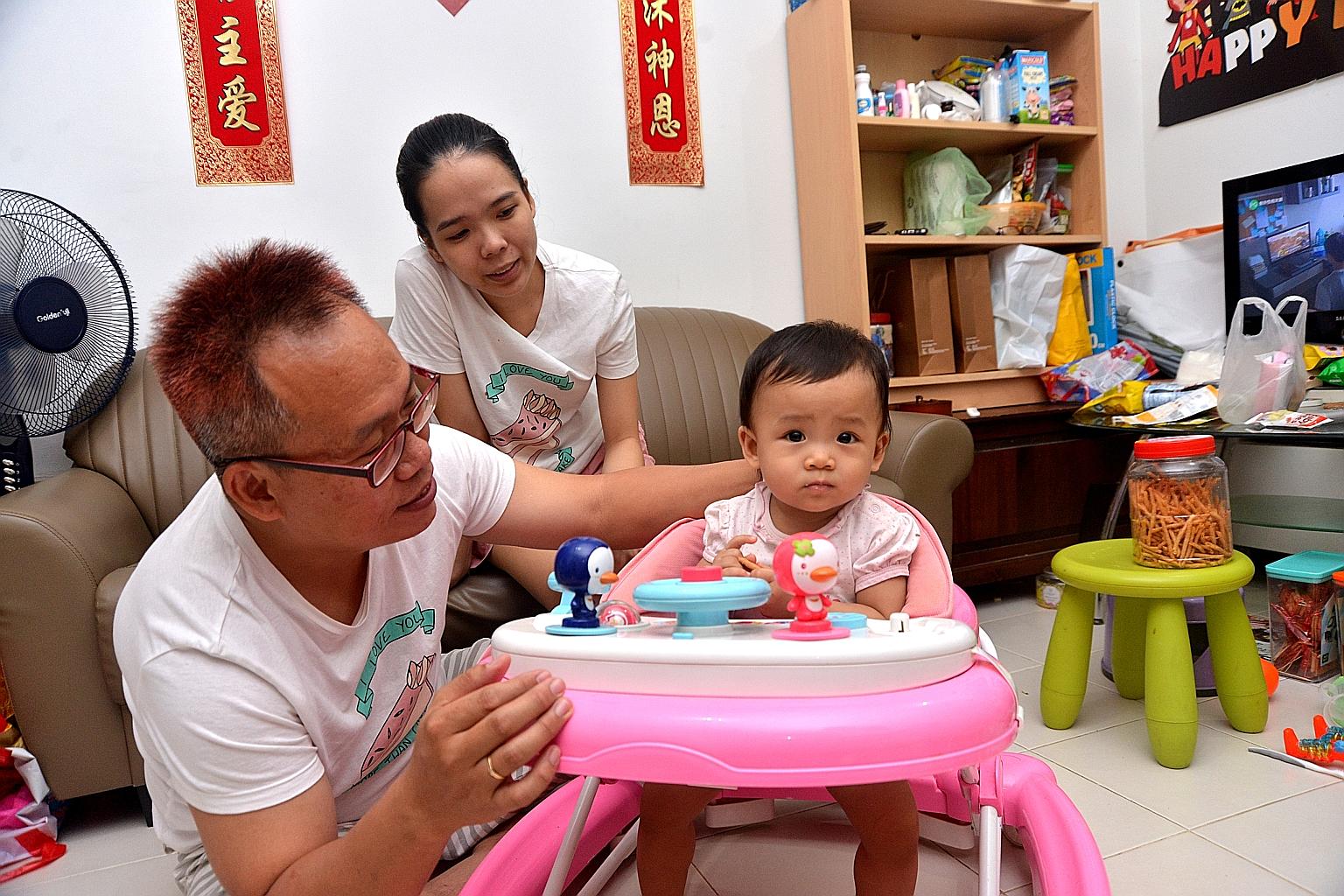Singapore Budget 2018: Lower-income groups worry about GST hike
Sign up now: Get ST's newsletters delivered to your inbox

Mr Tony Teng, with wife Nguyen Thi Huyen Linh, 26, and one-year-old daughter Donna, is worried about his young family's growing expenses. Academics and experts noted that the lower-income groups will feel the pinch more from a GST increase.
PHOTO: AZIZ HUSSIN FOR THE STRAITS TIMES
With the impending goods and services tax (GST) hike, Mr Tony Teng, 43, worries about his young family's growing expenses.
The ambulance driver supports his one-year-old daughter, pregnant wife and elderly parents on a $1,800 monthly salary.
Lower-income families like Mr Teng's are among groups who could be hit hardest when the GST goes up from 7 per cent to 9 per cent some time between 2021 and 2025.
The GST was last raised in 2007 from 5 per cent to 7 per cent.
Finance Minister Heng Swee Keat yesterday said the hike is to help pay for "recurrent needs", such as security demands, healthcare for an ageing population and other social spending.
To help lower-income households and seniors, he said the permanent GST Voucher scheme will be enhanced when the tax goes up.
The GST Voucher Fund will get a $2 billion top-up this year, he said, adding that lower-and middle-income families will also benefit from an offset package for a period to help them adjust.
Mr Teng wonders if these measures will be enough to cushion the long-term impact on living costs.
Others, like cleaner Paul Thanabal, 64, question the logic of having to pay more for daily spending on necessities, to fund social policies that will take time to reach low-income households.
The sole breadwinner for his family of three earns $750 a month, and receives a monthly $120 Workfare supplement. His diabetes treatments are also fully subsidised by a government hospital.
"I know these policies cost money, but many of us are already living day-to-day. Every dollar that comes in is spent on necessities," said Mr Thanabal, who lives in a two-room rental flat.
Academics and experts noted that the lower-income groups will feel the pinch more from a GST increase.
This is even though the bulk of GST is paid by higher-income households that spend more, with 84 per cent of all GST paid coming from those, including the top 40 per cent of households and foreigners.
DBS senior economist Irvin Seah predicted that the offset package could amount to at least $4 billion.
Such a package will be necessary to "soothe the pain for households, particularly the lower-income families", he said.
OCBC Bank's head of treasury research and strategy Selena Ling said Singapore's overall fiscal policy has always emphasised a fair tax regime. She cited last year's income tax hike, which impacted those in the wealthiest bracket most, as an example of addressing income inequality.
The tax hike will give Singapore the "fiscal ammunition" it needs to meet growing infrastructure demands and rising healthcare expenditures that will benefit all, she added.
Said Ms Ling: "At the end of the day, a vibrant and growing economy with healthy job creation is a tide that lifts all boats."
The delayed roll-out of the hike also offers respite to some, like engineer Emily Tan, 25, who has been fretting over upcoming big-ticket purchases. She plans to have her wedding in 2020 and renovate her home in 2021.
Observers noted that there is a political element to the timing, as tax hikes are unpopular moves.
The hike will take place after the current term of government, allowing it to honour its earlier "promise" that there should be no GST increase till the end of the decade, said National University of Singapore (NUS) academic Simon Poh.
Political scientist Derek da Cunha said not fixing an implementation date "gives the Government enough wiggle room on deciding its precise timing based on political circumstances".
Said Associate Professor Stephen Phua of NUS: "Raising revenue is a matter of pure necessity, but where you are going to harvest it from is a policy choice."


